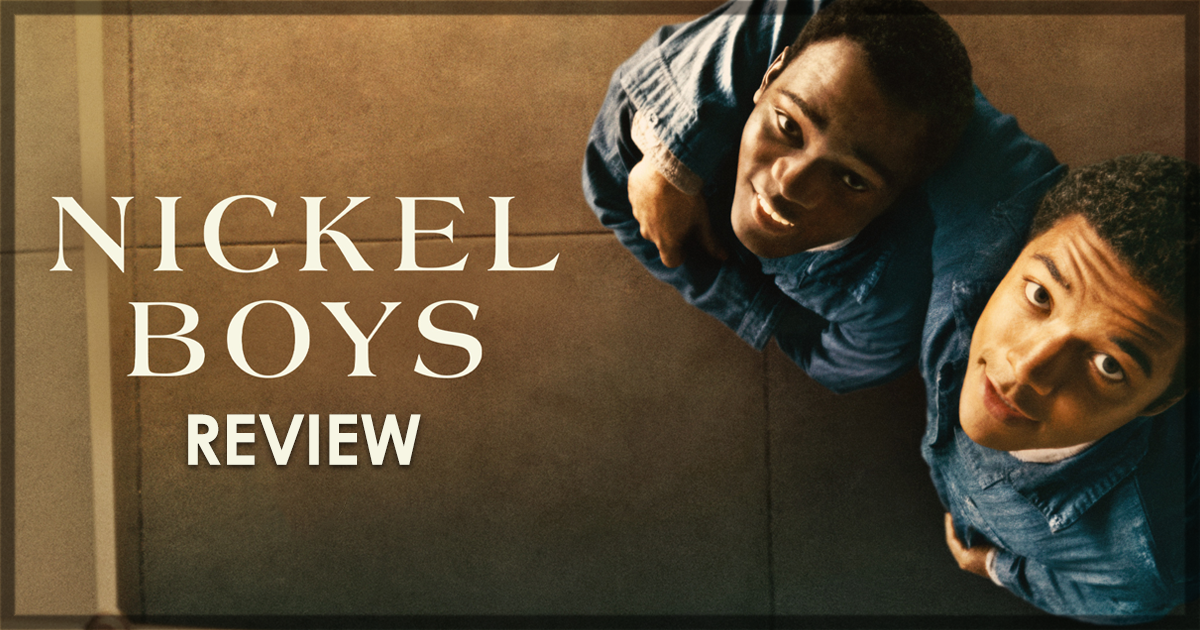From the moment the programme for the London Film Festival was announced, Nickel Boys quickly became one of my most anticipated films of the entire festival. Not only did the film receive positive reviews after its world premiere at the Telluride Film Festival at the end of August, but its story is also incredibly fascinating and inspires a reflection on contemporary corruption and racism, despite its past setting. To add a further layer to the movie, the story is inspired by a real-life case: in real life, the academy responsible for the abusive treatment of its students was called the Dozier School for Boys.
Based on a novel of the same name, Nickel Boys starts in the 1960s in Tallahassee, where a young Elwood Curtis (Ethan Cole Sharp), a studious African American high-schooler fascinated with the Civil Rights Movement, is selected to attend university classes for free. However, in 1962, Elwood is falsely accused of stealing a car and sent to the Nickel Academy, a segregated and corrupt reform school. There, he befriends Turner (Brandon Wilson) as they attempt to survive together the harsh reality of the school, made up of poor education, hard physical labor, frequent corporal punishments, and various secrets that the Nickel Academy attempts to keep hidden from the authorities.
Admittedly, Nickel Boys is a very traumatic film to watch. Despite having a rough idea of where the film is going before we watch it, I still could not help but root for the main characters, thanks to the sympathetic and emotional portrayal by the lead actors. This made their eventual downfall, due to an inherently racist and flawed system more than anything else, even more heartbreaking. It also feels incredibly unjust as we see how systemic racism negatively affects two people’s lives right in front of our eyes. Not only does the movie portray a tragic story that would be hard to watch – or even hear about – under any circumstances, but the film, almost literally makes the viewer live through such events themselves. In fact, the film allows us to virtually walk into the protagonist’s shoes through the frequent use of extreme close-ups and point-of-view shots throughout its runtime.
The most fascinating element of Nickel Boys is the way it is filmed. The aforementioned use of a first-person point-of-view shot is a bold and groundbreaking choice. Technically, this must have been a challenge to shoot as a lot of the film is made up of extreme close-ups and moving camera as the see the world through the protagonists’ eyes. At the same time, it is very innovative: of course, first-person point-of-view shots have long existed in cinema, but this is the first time I have seen a film use them so extensively and significantly. On paper, it is incredibly hard to pull off a film told almost exclusively in the first person point of view, and yet RaMell Ross manages to make it work excellently.
Unfortunately, Nickel Boys does at times step away from the style and aesthetic it establishes at the very beginning of the film. As the film went on, I wished that the camera would have stayed exclusively in the first-person point of view perspective that it opens with. Not only is this incredibly innovative, but switching in and out of the point-of-view shots can also easily become confusing for the audience and somewhat frustrating to follow. The constant use of archival footage also seems a little repetitive about halfway through the movie once we realize that this is something the movie will keep repeating. Some of it also seems too long – the over-two-hour runtime is definitely felt in the final act. The film takes its time to run us through the story – and rightfully so – with a pace that, at times, feels slower than what I would have liked.
Some of Nickel Boys may be confusing or hard to grasp at first, which may make it harder for the film to do well with a mainstream audience once it comes out in cinemas outside of film festivals. However, it is so refreshing to see movies dare to do something so boldly new and original and innovate the film form itself that this is only a minor complaint. While a very complicated and heartbreaking watch, it is probably a film I would have to watch again to fully grasp the richness of its themes and analysis, some of which may easily get lost on a first watch.
Ultimately, Nickel Boys is an incredibly exciting film that remains unlike anything else I have seen this year, or in the past few years even. And for this aspect alone, it should be celebrated as the impressive work that it is. RaMell Ross’ movie should be watched on the biggest screen possible to truly enjoy it in all its nuances and details and appreciate its groundbreaking use of film as a medium. A strong and important storyline is matched by an incredible use of filmmaking techniques that easily makes it one of the most unique and unforgettable films of the year.
Nickel Boys recently screened at the London Film Festival.
Learn more about the film at the MGM site for the title.


